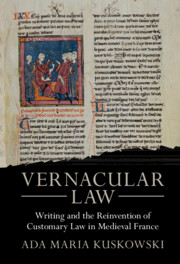Book contents
- Vernacular Law
- Studies In Legal History
- Vernacular Law
- Copyright page
- Dedication
- Contents
- Figures
- Acknowledgments
- A Note on the Text
- Introduction Vernacular Writing and the Transformation of Customary Law in Medieval France
- Part I Written Custom and the Formation of Vernacular Law
- Part II Political and Intellectual Tensions
- Part III Implications
- 6 Custom in Lawbooks and Records of Legal Practice
- 7 Dynamic Text: Dialectic, Manuscript Culture, and Customary Law
- 8 Implications of Circulating Text: Crafting a French Common Law
- Conclusion Lasting Model and Professional Community
- Bibliography
- Index
6 - Custom in Lawbooks and Records of Legal Practice
from Part III - Implications
Published online by Cambridge University Press: 27 October 2022
- Vernacular Law
- Studies In Legal History
- Vernacular Law
- Copyright page
- Dedication
- Contents
- Figures
- Acknowledgments
- A Note on the Text
- Introduction Vernacular Writing and the Transformation of Customary Law in Medieval France
- Part I Written Custom and the Formation of Vernacular Law
- Part II Political and Intellectual Tensions
- Part III Implications
- 6 Custom in Lawbooks and Records of Legal Practice
- 7 Dynamic Text: Dialectic, Manuscript Culture, and Customary Law
- 8 Implications of Circulating Text: Crafting a French Common Law
- Conclusion Lasting Model and Professional Community
- Bibliography
- Index
Summary
The sixth chapter examines the relationship between coutumiers as texts that describe custom, and custom in practice. The difficulty with discussing this is that the coutumiers only begin to be cited in court records at the very end of the thirteenth century and very rarely even then. This was not unusual for the lay courts of northern France in this period, which cited ‘custom’ and not lawbooks or specific precedents. I discuss the relationship between the coutumiers and representations of practice – as filtered through its documentary record-keeping – in two ways. On one level, this chapter shows how at least some people were thinking about court cases that they presided over, took part in, witnessed or heard about. On another, this chapter demonstrates how the coutumier represents practice differently from other remaining records and how coutumier authors used what they saw in practice to extract principles and articulate general rules. Through the coutumiers, we can see how individual actors reshaped specific cases and transactions into general principles, and those general principles into a body of customary law.
Keywords
- Type
- Chapter
- Information
- Vernacular LawWriting and the Reinvention of Customary Law in Medieval France, pp. 233 - 264Publisher: Cambridge University PressPrint publication year: 2022



